Macedon or Macedonia Ancient Kingdom 8th century BC
Authentic Ancient Numismatic Coins for Sale Investment available
to buy at online Coin shop
Macedonia was an ancient kingdom, centered in the northeastern part of
the Greek peninsula, bordered by Epirus to the west, Paionia to the
north, the region of Thrace to the east and Thessaly to the south. .
All coins you purchase from the store are professionally
researched, photographed and provided with a lifetime guarantee of
authenticity.
TrustedCoins.com
You can watch the video below for more info.
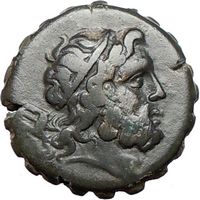
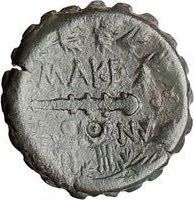
Example of Authentic Ancient
Coin of:
Macedonia Autonomous Issue
Serrate Bronze Struck 185-168 B.C.
under Greek King: Philip V - King of Macedonia: 221-179 B.C.
& Greek King: Perseus - Macedonian King: 179-168 B.C. -
Reference: SNG Copenhagen 1294; Gaebler I pg. 32, 32; AMNG 32
Diademed head of Poseidon right, trident over shoulder.
Club, legend MAKE / ΔONΩN,
and two monograms within oak wreath.
Son of Demetrios II,
Philip V came to power in 221 B.C. on the death of Antigonos Doson. He
was a vigorous ruler and maintained the power of the Macedonian kingdom
in the earlier part of his reign. However, he made the mistake of
arousing the enmity of the Romans, and in 197 B.C. his power was crushed
at the battle of the Kynoskephalai by the Roman general T. Quinctius
Flamininus. After this his power and territory were severely curtailed
by Rome, and the days of the Macedonian kingdom were numbered.
The eldest son of Philip V, Perseus was the last king
of Macedon. He inherited a kingdom already largely dependent on Rome,
but his policies aroused Roman suspicions and armed conflict became
inevitable. At the battle of Pydna, in 168 B.C., Perseus lost his
kingdom and he died two years later as an exile in Italy.
Macedonia or Macedon (from
Greek:
Μακεδονία, Makedonía)
was an ancient
kingdom, centered in the northeastern
part of the
Greek peninsula,
bordered by
Epirus to the west,
Paionia to the north, the region of
Thrace to the east and
Thessaly to the south. For a brief
period, after the conquests of
Alexander the Great, it became the most
powerful state in the world, controlling a territory that included most
of
Greece and
Persia, stretching as far as the
Indus River; at that time it
inaugurated the
Hellenistic period of
history.
Name
The name Macedonia (Greek:
Μακεδονία,
Makedonía) is
related to the ancient Greek word μακεδνός (Makednos).
It is commonly explained as having originally meant 'a tall one' or
'highlander', possibly descriptive of the
people. The shorter English name
variant Macedon developed in Middle English, based on a borrowing
from the French form of the name, Macédoine.
History
Early
history and legend
The lands around Aegae, the first Macedonian capital, were home to
various peoples. Macedonia was called Emathia (from king Emathion) and
the city of Aiges was called Edessa, the capital of fabled king Midas.
According to legend, Caranus, accompanied by a multitude of Greeks came
to the area in search for a new homeland
[5] took Edessa and renamed it to
Aegae. Subsequently, he expelled Midas and other kings off the lands and
he formed his new kingdom. According to Herodot, it was Dorus, the son
of Hellen who led his people to Histaeotis, whence they were driven off
by the Cadmeians into Pindus, where they settled as Macedonians. Later,
a branch would migrate further south to be called Dorians
[6].
It seems that the first
Macedonian state emerged in the
8th or early
7th century BC under the
Argead Dynasty, who, according to
legend, migrated to the region from the
Greek city of
Argos in Peloponnesus (thus the name
Argead).[7]
It should be mentioned that the Macedonian tribe ruled by the Argeads,
was itself called Argead (which translates as "descended from Argos").
The kingdom was situated in the fertile alluvial plain, watered by
the rivers
Haliacmon and
Axius, called Lower Macedonia,
north of the mountain
Olympus. Around the time of
Alexander I of Macedon, the Argead
Macedonians started to expand into
Upper Macedonia, lands inhabited by
independent Macedonian tribes like the Lyncestae and the Elmiotae and to
the West, beyond Axius river, into
Eordaia,
Bottiaea,
Mygdonia, and
Almopia-, regions settled by, among
others, many Thracian tribes.[8]
Near the modern city of
Veria,
Perdiccas I (or, more likely, his son,
Argaeus I) built his capital, Aigai
(modern
Vergina). After a brief period under
Persian rule under
Darius Hystaspes, the state regained
its independence under King
Alexander II (495–450
BC).
In the long
Peloponnesian War Macedon was a
secondary power that alternated in support between Sparta and Athens.
Involvement in the Greek world
Prior to the
4th century BC, the kingdom covered a
region approximately corresponding to the
province of Macedonia of modern
Greece Amyntas III (c.
393–370
BC), though it still retained strong contrasts between the
cattle-rich coastal plain and the fierce isolated tribal hinterland,
allied to the king by marriage ties. They controlled the passes through
which barbarian invasions came from
Illyria to the north and northwest. It
became increasingly
Atticised during this period, though
prominent
Athenians appear to have regarded the
Macedonians as uncouth.[10]
Before the establishment of the
League of Corinth, even though the
Macedonians apparently spoke a dialect of the Greek language and claimed
proudly that they were Greeks, they were not considered to fully share
the
classical Greek culture by many of the
inhabitants of the southern city states, because they did not share the
polis based style of government of the
southerners.[9]
Herodotus, being one of the foremost
biographer in antiquity who lived in Greece at the time when the
Macedonian king
Alexander I was in power, mentioned: "I
happen to know, and I will demonstrate in a subsequent chapter of this
history, that these descendants of Perdiccas are, as they themselves
claim, of Greek nationality. This was, moreover, recognized by the
managers of the
Olympic games, on the occasion when
Alexander wished to compete and his
Greek competitors tried to exclude him on the ground that foreigners
were not allowed to take part. Alexander, however, proved his Argive
descent, and so was accepted as a Greek and allowed to enter for the
foot-race. He came in equal first"..[11]
Over the 4th century Macedon became more politically involved with
the south-central city-states of
Ancient GreecePella, resembling
Mycenaean culture more than classic
Hellenic city-states, and other archaic
customs, like Philip's multiple wives in addition to his Epirote queen
Olympias, mother of Alexander.
Another archaic remnant was the very persistence of a
hereditary
monarchy which wielded formidable –
sometimes absolute – power, although this was at times checked by the
landed aristocracy, and often disturbed by power struggles within the
royal family itself. This contrasted sharply with the Greek cultures
further south, where the ubiquitous city-states mostly possessed
aristocratic or democratic institutions; the
de facto monarchy of
tyrants, in which heredity was usually
more of an ambition rather than the accepted rule; and the limited,
predominantly military and sacerdotal, power of the twin hereditary
Spartan kings. The same might have held
true of
feudal institutions like
serfdom, which may have persisted in
Macedon well into historical times. Such institutions were abolished by
city-states well before Macedon's rise (most notably by the Athenian
legislator
Solon's famous
σεισάχθεια
seisachtheia laws)..
Amyntas had three sons; the first two,
Alexander II and
Perdiccas III reigned only briefly.
Perdiccas III's infant heir was deposed by Amyntas' third son,
Philip II of Macedon, who made himself
king and ushered in a period of Macedonian dominance of Greece. Under
Philip II, (359–336
BC), Macedon expanded into the territory of the
Paionians,
Thracians, and
Illyrians. Among other conquests, he
annexed the regions of
Pelagonia and Southern
Paionia.[12]]

Kingdom of Macedon after Philip's II death.
Philip redesigned the
army of Macedon adding a number of
variations to the traditional
hoplite
hetairoi, a well armoured heavy
cavalry, and more light infantry, both of which added greater
flexibility and responsiveness to the force. He also lengthened the
spear and shrank the shield of the main infantry force, increasing its
offensive capabilities.
Philip began to rapidly expand the borders of his kingdom. He first
campaigned in the north against non-Greek peoples such as the
IllyriansAmphipolis, which controlled
the way into
Thracee and also was near valuable
silver mines. This region had been part of the
Athenian Empire, and Athens still
considered it as in their sphere. The Athenians attempted to curb the
growing power of Macedonia, but were limited by the outbreak of the
Social War. They could also do little
to halt Philip when he turned his armies south and took over most of
Thessaly.
Control of Thessaly meant Philip was now closely involved in the
politics of central Greece. 356 BCE saw the outbreak of the
Third Sacred War that pitted
Phocis against
Thebes and its allies. Thebes recruited
the Macedonians to join them and at the
Battle of Crocus Field Phillip
decisively defeated Phocis and its Athenian allies. As a result
Macedonia became the leading state in the
Amphictyonic League and Phillip became
head of the Pythian Games, firmly putting the Macedonian leader at the
centre of the Greek political world.
In the continuing conflict with Athens Philip marched east through
Thrace in an attempt to capture
Byzantium and the
Bosphorus, thus cutting off the Black
Sea grain supply that provided Athens with much of its food. The siege
of Byzantium failed, but Athens realized the grave danger the rise of
Macedon presented and under
Demosthenes built a coalition of many
of the major states to oppose the Macedonians. Most importantly Thebes,
which had the strongest ground force of any of the city states, joined
the effort. The allies met the Macedonians at the
Battle of Chaeronea and were decisively
defeated, leaving Philip and the Macedonians the unquestioned master of
Greece.
Empire
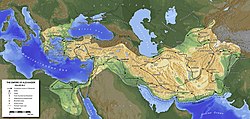
Alexander's empire at the time of its maximum expansion
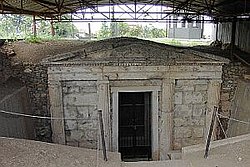
The entrance to one of the royal tombs at Vergina, a UNESCO
World Heritage site.
Philip's son,
Alexander the Great (356–323
BC), managed to briefly extend Macedonian power not only over
the central Greek city-states, but also to the
Persian empire, including
Egypt and lands as far east as the
fringes of
India. Alexander's adoption of the
styles of government of the conquered territories was accompanied by the
spread of Greek culture and learning through his vast empire. Although
the empire fractured into multiple Hellenic regimes shortly after his
death, his conquests left a lasting legacy, not least in the new
Greek-speaking cities founded across Persia's western territories,
heralding the
HellenisticDiadochi, Macedonia fell to
the
Antipatrid dynasty, which was
overthrown by the
Antigonid dynasty after only a few
years, in 294 BC..
Hellenistic era
Antipater and his son
Cassander gained control of Macedonia
but it slid into a long period of civil strife following Cassander's
death in
297 BC. It was ruled for a while by
Demetrius I (294–288
BC) but fell into civil war.
Demetrius' son,
Antigonus II (277–239
BC), defeated a
Galatian invasion as a
condottiere, and regained his
family's position in Macedonia; he successfully restored order and
prosperity there, though he lost control of many of the Greek
city-states. He established a stable monarchy under the
Antigonid dynasty.
Antigonus III ((239–221
BC) built on these gains by re-establishing Macedonian power
across the region.
What is notable about the Macedonian regime during the Hellenistic
times is that it was the only successor state to the Empire that
maintained the old archaic perception of Kingship, and never adopted the
ways of the Hellenistic Monarchy. Thus the king was never deified in the
same way that Ptolemies and Seleucids were in Egypt and Asia
respectively, and never adopted the custom of
Proskynesis. The ancient Macedonians
during the Hellenistic times were still addressing their kings in a far
more casual way than the subjects of the rest of the Diadochi, and the
Kings were still consulting with their aristocracy (Philoi) in the
process of making their decisions.
Conflict with Rome

Kingdom of Macedon under Philip V.
Under
Philip V of Macedon (221–179
BC Perseus of Macedon (179–168
BC), the kingdom clashed with the rising power of the
Roman Republic. During the
2nd and
1st centuries BC, Macedon fought a
series of wars with Rome. Two major
losses that led to their inevitable defeat were in
197 BC when Rome defeated Philip V, and
168 BC when Rome defeated Perseus. The
overall losses resulted in the defeat of Macedon, the deposition of the
Antigonid dynasty and the dismantling of the Macedonian kingdom.
Andriscus' brief success at
reestablishing the monarchy in
149 BCC was quickly followed by his
defeat the following year and the establishment of direct
Roman rule and the organization of
Macedon as the
Roman province of Macedonia.
Institutions
éthnē), and between the two, the districts. The study of these different
institutions has been considerably renewed thanks to
epigraphy, which has given us the
possibility to reread the indications given us by ancient literary
sources such as
Livy and
Polybius. They show that the Macedonian
institutions were near to those of the Greek federal states, like the
Aetolian and
Achaeann leagues, whose unity was
reinforced by the presence of the king.

The
Vergina Sun, the 16-ray star
covering what appears to be the royal burial larnax of Philip II
of Macedon, discovered in Vergina, Greece.
The King
The
kingΒασιλεύς,
Basileús) headed
the central administration: he led the kingdom from its capital, Pella,
and in his royal palace was conserved the state's archive. He was helped
in carrying out his work by the Royal Secretary (βασιλικὸς
γραμματεύς,
basilikós grammateús), whose work was of primary importance,
and by the
Council.
The king was commander of the army, head of the Macedonian religion,
and director of diplomacy. Also, only he could conclude treaties, and,
until
Philip V, mint coins.
The number of civil servants was limited: the king directed his
kingdom mostly in an indirect way, supporting himself principally
through the local magistrates, the epistates, with whom he constantly
kept in touch.
Successionon
Royal succession in Macedon was hereditary, male,
patrilineal and generally respected the
principle of
primogeniture. There was also an
elective element: when the king died, his designated heir, generally but
not always the eldest son, had first to be accepted by the council and
then presented to the general Assembly to be acclaimed king and obtain
the oath of fidelity.
Perdiccas III, slain by the
Illyrians,
Philip II assassinated by
Pausanias of Orestis,
Alexander the Great, suddenly died of
malady, etc. Succession crises were frequent, especially up to the
4th century BC, when the magnate
families of Upper Macedonia still cultivated the ambition of
overthrowing the Argaead dynasty and to ascend to the throne.
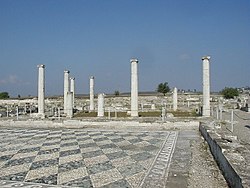
An atrium with a pebble-mosaic paving, in Pella, Greece
Financesces
The king was the simple guardian and administrator of the treasure of
Macedon and of the king's incomes (βασιλικά,
basiliká), which
belonged to the Macedonians: and the tributes that came to the kingdom
thanks to the treaties with the defeated people also went to the
Macedonian people, and not to the king. Even if the king was not
accountable for his management of the kingdom's entries, he may have
felt responsible to defend his administration on certain occasions:
Arrian tells us that during the
mutiny of Alexander's soldiers at
Opis in
324 BC BC, Alexander detailed the
possessions of his father at his death to prove he had not abused his
charge.
It is known from Livy and Polybius that the basiliká included
the following sources of income:
- The mines of gold and silver (for example those of the
Pangaeus), which were the exclusive
possession of the king, and which permitted him to strike currency,
as already said his sole privilege till Philip V, who conceded to
cities and districts the right of coinage for the lesser
denominations, like bronze.
- The forests, whose timber was very appreciated by the
Greek cities to build their ships: in particular, it is known that
Athens made commercial treaties
with Macedon in the
5th century BC to import the timber
necessary for the construction and the maintenance of its fleet of
war.
- The royal landed properties, lands that were annexed to
the royal domain through conquest, and that the king exploited
either directly, in particular through servile workforce made up of
prisoners of war, or indirectly through a leasing system.
- The port duties on commerce (importation and exportation
taxes).
The most common way to exploit these different sources of income was
by leasing: the
Pseudo-Aristotle reports in the
Oeconomica that
Amyntas III (or maybe Philip II)
doubled the kingdom's port revenues with the help of
Callistratus, who had taken refuge in
Macedon, bringing them from 20 to 40
talents per year. To do this, the
exploitation of the harbour taxes was given every year at the private
offering the highest bidding. It is also known from Livy that the mines
and the forests were leased for a fixed sum under Philip V, and it
appears that the same happened under the Argaead dynasty: from here
possibly comes the leasing system that was used in
Ptolemaic Egypt.
Except for the king's properties, land in Macedon was free:
Macedonians were free men and did not pay land taxes on private grounds.
Even extraordinary taxes like those paid by the Athenians in times of
war did not exist. Even in conditions of economic peril, like what
happened to Alexander in
334 BC< and Perseus in
168 BC, the monarchy did not tax its
subjects but raised funds through loans, first of all by his Companions,
or raised the cost of the leases.
The king could grant the atelíē (ἀτελίη),
a privilege of tax exemption, as Alexander did with those Macedonian
families which had losses in the
battle of the Granicus in May
334334: they were exempted from paying
tribute for leasing royal grounds and commercial taxes.
Extraordinary incomes came from the spoils of war, which were divided
between the king and his men. At the time of Philip II and Alexander,
this was a considerable source of income. A considerable part of the
gold and silver objects taken at the time of the European and Asian
campaigns were melted in ingots and then sent to the monetary foundries
of
PellaAmphipolis, most active of the
kingdom at that time: an estimate judges that during the reign of
Alexander only the mint of Amphipolis struck about 13 million silver
tetradrachms.
The Assembly
All the kingdom's citizen-soldiers gather in a popular assembly,
which is held at least twice a year, in spring and in autumn, with the
opening and the closing of the campaigning season.
This assembly (koinê
ekklesia or
koinon makedonôn), of the army in times of war, of the people
in times of peace, is called by the king and plays a significant role
through the acclamation of the kings and in capital trials; it can be
consulted (without obligation) for the foreign politics (declarations of
war, treaties) and for the appointment of high state officials. In the
majority of these occasions, the Assembly does nothing but ratify the
proposals of a smaller body, the Council. It is also the Assembly which
votes the honors, sends embassies, during its two annual meetings. It
was abolished by the
Romans at the time of their
reorganization of Macedonia in
167 BC, to prevent, according to
Livy, that a demagogue could make use
of it as a mean to revolt against their authority.
The Friends (philoi)
or the king's Companions (basilikoi
hetairoi) were named for life by
the king among the Macedonian aristocracy.cy.
The most important generals of the army (hégémones
tôn taxéôn), also named by the king.
The king had in reality less power in the choice of the members of
the Council than appearances would warrant; this was because many of the
kingdom's most important noblemen were members of the Council by
birth-right.
The Council primarily exerted a probouleutic function with respect to
the Assembly: it prepared and proposed the decisions which the Assembly
would have discussed and voted, working in many fields such as the
designation of kings and regents, as of that of the high administrators
and the declarations of war. It was also the first and final authority
for all the cases which did not involve capital punishment.
The Council gathered frequently and represented the principal body of
government of the kingdom. Any important decision taken by the king was
subjected before it for deliberation.on.
Inside the Council ruled the democratic principles of iségoria
(equality of word) and of parrhésia (freedom of speech), to which
even the king subjected himself.
After the removal of the
Antigonid dynasty by the Romans in
167 BC, it is possible that the
synedrion remained, unlike the Assembly, representing the sole federal
authority in Macedonia after the country's division in four merides.
Regional districts (Merides)
The creation of an intermediate territorial administrative level
between the central government and the cities should probably be
attributed to Philip II: this reform corresponded with the need to adapt
the kingdom's institutions to the great expansion of Macedon under his
rule. It was no longer practical to convene all the Macedonians in a
single general assembly, and the answer to this problem was the creation
of four regional districts, each with a regional assembly. These
territorial divisions clearly did not follow any historical or
traditional internal divisions; they were simply artificial
administrative lines.
This said, it should be noted that the
existence of these districts is not attested with certainty (by
numismatics) before the beginning of
the
2nd century BC.
|